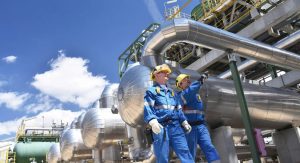Chemical engineering is one of the most dynamic and versatile fields in the engineering sector, with professionals applying their knowledge to industries as diverse as pharmaceuticals, petrochemicals, food processing, and more.
Chemical engineers work on creating commonplace items from raw materials. Alternative titles for this role include process engineer and biochemical engineer.
For aspiring chemical engineers, one of the most pressing questions revolves around salary expectations. Knowing the potential earnings at different stages of your career is crucial for setting realistic goals and making informed decisions.
In this article, we’ll explore the salary for chemical engineer in the UK, from entry-level to senior professionals, and provide insights into the career paths, qualifications, and factors that influence pay.
What Determines a Chemical Engineer’s Salary in the UK?

Several factors influence a chemical engineer’s salary in the UK. First and foremost, education and qualifications play a significant role, with higher degrees and specialised certifications leading to better pay.
Additionally, the industry in which you work, whether it’s petrochemical, pharmaceutical, or food processing, will impact your earnings.
Geographic location also matters; chemical engineers working in London or other high-demand areas tend to earn more than those in smaller regions. Finally, as with most professions, experience levels and career progression are key drivers of salary growth.
Beyond these factors, work schedules and shifts can also affect compensation. Chemical engineers typically work 39 to 41 hours a week, though in certain sectors, shift work, including evenings, weekends, or bank holidays, may be required.
How Much Does an Entry-Level Chemical Engineer Earn in the UK?
For recent graduates, starting salaries are an important consideration. On average, an entry-level chemical engineer in the UK can expect to earn between £28,000 and £35,000 annually. In certain sectors, such as petrochemicals or pharmaceuticals, these figures may be higher.
The starting salary for a chemical engineer is typically around £30,000 per year, but can vary depending on location and employer. Graduate programmes offered by large corporations often include structured pay raises and training, giving young professionals a clear pathway to higher earnings.
| Experience Level | Average Salary | Salary Range |
| Entry-Level | £30,000 | £28,000 – £35,000 |
What Is the Average Salary for Mid-Level Chemical Engineers in the UK?
Once you’ve gained a few years of experience, your earning potential as a chemical engineer rises significantly. Mid-level chemical engineers, typically with 5–10 years of experience, can expect salaries ranging from £40,000 to £55,000.
These figures often reflect the added responsibilities that come with experience, including project management and more complex technical roles.
At this stage of your career, additional qualifications, such as a Master’s in Chemical Engineering (MEng), may further boost your salary prospects.
Many universities also offer foundation years for students without strong science or maths backgrounds, making it easier to enter the field and build a rewarding career.
| Experience Level | Average Salary | Salary Range |
| Mid-Level | £47,500 | £40,000 – £55,000 |
How Much Do Senior Chemical Engineers Earn in the UK?

At the senior level, where chemical engineers have over a decade of experience, salaries can reach £65,000 to £90,000 per year, with some top professionals earning even more, especially if they take on managerial or leadership roles.
Senior chemical engineers not only have significant technical expertise but are often responsible for leading teams, overseeing major projects, and making high-stakes decisions that affect company operations.
The salary for senior roles can also be influenced by the size of the company and the complexity of the projects being handled. Large projects involving international operations, for example, often come with attractive compensation packages, including bonuses and profit-sharing.
| Experience Level | Average Salary | Salary Range |
| Senior | £77,500 | £65,000 – £90,000 |
What Are the Salary Trends for Chemical Engineers in Specialised Sectors?
For chemical engineers working in specialised sectors, such as petrochemical engineering, salaries tend to be on the higher end of the spectrum. Petrochemical engineers often earn between £50,000 and £85,000 annually, depending on their level of expertise and the specific demands of the industry.
In the biochemical and process engineering sectors, salaries also tend to be higher. These areas often require engineers to work on cutting-edge technologies and solutions, driving up the demand for highly skilled professionals.
| Specialisation | Average Salary | Salary Range |
| Petrochemical Engineering | £67,500 | £50,000 – £85,000 |
| Biochemical Engineering | £60,000 | £45,000 – £80,000 |
| Process Engineering | £57,000 | £40,000 – £75,000 |
How Do UK Regional Pay Differences Affect Chemical Engineer Salaries?

Where you work in the UK can have a significant impact on your salary as a chemical engineer. Chemical engineers in London and the South East typically earn higher salaries compared to those in other regions, with the cost of living playing a major role in these differences.
A senior chemical engineer in London may earn as much as £90,000, whereas a similar role in Scotland or Wales may offer closer to £65,000.
Below are the highest paying cities for chemical engineers in the UK:
| City | Average Salary |
| London | £56,339 per year |
| Thurso | £50,345 per year |
| Manchester | £38,806 per year |
| Bristol | £37,925 per year |
| Birmingham | £37,689 per year |
| Nottingham | £36,991 per year |
| Southampton | £36,331 per year |
| Belfast | £32,955 per year |
| Falkirk | £25,270 per year |
What Factors Impact a Chemical Engineer’s Income?
Several factors can influence a chemical engineer’s salary. Company size is a significant determinant, with larger organisations typically offering higher pay than smaller firms.
Additionally, the overall job market for chemical engineers, which can fluctuate based on industry demand, will impact salaries. During periods of high demand for chemical engineers, such as when companies are investing in energy projects, salaries can rise.
The nature of the projects you work on can also have a direct influence on your income. Complex, high-profile projects often come with additional compensation or bonuses, particularly for senior engineers.
How Can Chemical Engineers Increase Their Salary?

If you’re looking to increase your salary as a chemical engineer, there are several strategies to consider. Pursuing additional qualifications, such as a Master’s degree or certifications in specialised areas like petrochemical engineering, can open up higher-paying roles.
Expanding your skill set by gaining experience in project management or leadership roles will also make you more attractive to employers, potentially leading to salary increases.
You could also consider starting as a chemical engineering technician and undergoing additional training while on the job. This approach allows you to gain practical experience while working towards full qualification as a chemical engineer, which can eventually lead to higher pay.
What Are the Long-Term Salary Prospects for Chemical Engineers in the UK?
Looking towards the future, the long-term salary prospects for chemical engineers in the UK are promising. As industries such as renewable energy and environmental technology continue to grow, the demand for chemical engineers is expected to rise, pushing salaries higher.
Additionally, the trend towards sustainable and green energy solutions could create new opportunities for chemical engineers, especially those with specialised knowledge in these areas.
How Do Contract and Freelance Opportunities Affect Chemical Engineer Pay?
For those seeking more flexibility, contract and freelance opportunities in chemical engineering can offer attractive compensation.
Freelancers in this field often earn higher hourly rates than their full-time counterparts, with rates ranging from £35 to £70 per hour, depending on the complexity of the work and the engineer’s experience.
However, it’s important to factor in the potential for income variability and the lack of employee benefits such as pensions or paid leave.
How Much Do Similar Professions Get Paid in the United Kingdom?

If you’re considering a career in chemical engineering, it’s also helpful to compare salaries across related professions.
Here’s a look at the pay for similar roles:
| Profession | Average Salary |
| Junior Chemical Engineer | £34,785 per year |
| Senior Chemical Engineer | £57,234 per year |
As you can see, the salary for junior chemical engineers is competitive, and as you move into senior roles, the pay increases significantly, reflecting the additional responsibilities and expertise required.
How to Become a Chemical Engineer in the UK?

If you’re interested in becoming a chemical engineer, there are several pathways you can explore:
University
Most chemical engineers hold a degree or postgraduate qualification in chemical engineering, process engineering, or biochemical engineering. If you lack the required background in maths and science, some universities offer foundation years that can prepare you for these degrees.
Alternatively, if you have a degree in a related field such as chemistry or polymer science, you can pursue a postgraduate conversion course to enter the field of chemical engineering. Postgraduate degrees, such as a Master’s in Chemical Engineering (MEng), often include research components and can help prepare you for further studies, such as a PhD.
Apprenticeship
Another pathway is through a science industry process engineer degree apprenticeship, which allows you to combine work experience with academic study.
Work-based Training
You can also begin your career as a chemical engineering technician and work your way up through on-the-job training.
Conclusion
In summary, the salary for chemical engineers in the UK varies significantly based on factors such as experience, industry, and location.
From entry-level roles offering around £28,000 to senior positions that can exceed £90,000, chemical engineering is a well-compensated and rewarding career.
By continuously improving your skills, gaining experience, and staying informed about industry trends, you can maximise your earning potential and thrive in this dynamic field.
FAQ Section
What is the average salary for chemical engineers in the UK?
The average salary for a chemical engineer in the UK typically ranges from £40,000 to £60,000, depending on experience, location, and industry specialisation.
How much do entry-level chemical engineers make in the UK?
Entry-level chemical engineers can expect to earn between £28,000 and £35,000 annually, depending on the sector and location.
Do chemical engineers earn more in London?
Yes, chemical engineers in London generally earn more due to the higher cost of living, with senior engineers making up to £90,000 or more.
How does petrochemical engineering salary compare to other sectors?
Petrochemical engineering offers some of the highest salaries in the field, with professionals earning between £50,000 and £85,000 annually.
What are the best ways to increase a chemical engineer’s salary?
Additional qualifications, such as a Master’s degree, taking on leadership roles, and specialising in high-demand sectors like petrochemicals or pharmaceuticals, can significantly boost salary potential.
What factors influence chemical engineer pay in the UK?
Factors include industry, geographic location, level of experience, company size, and the current job market conditions.
Is there high demand for chemical engineers in the UK?
Yes, demand for chemical engineers remains strong, particularly in high-growth areas like pharmaceuticals, energy, and environmental engineering.




